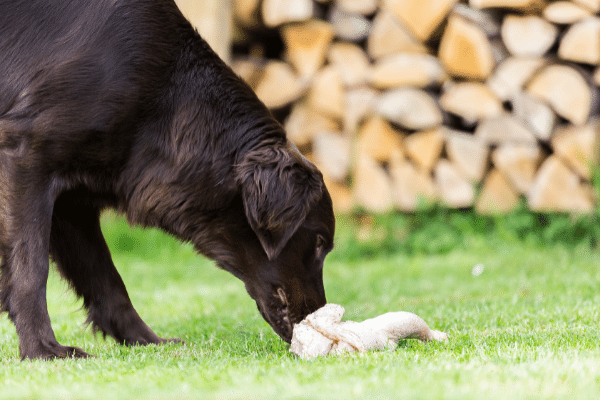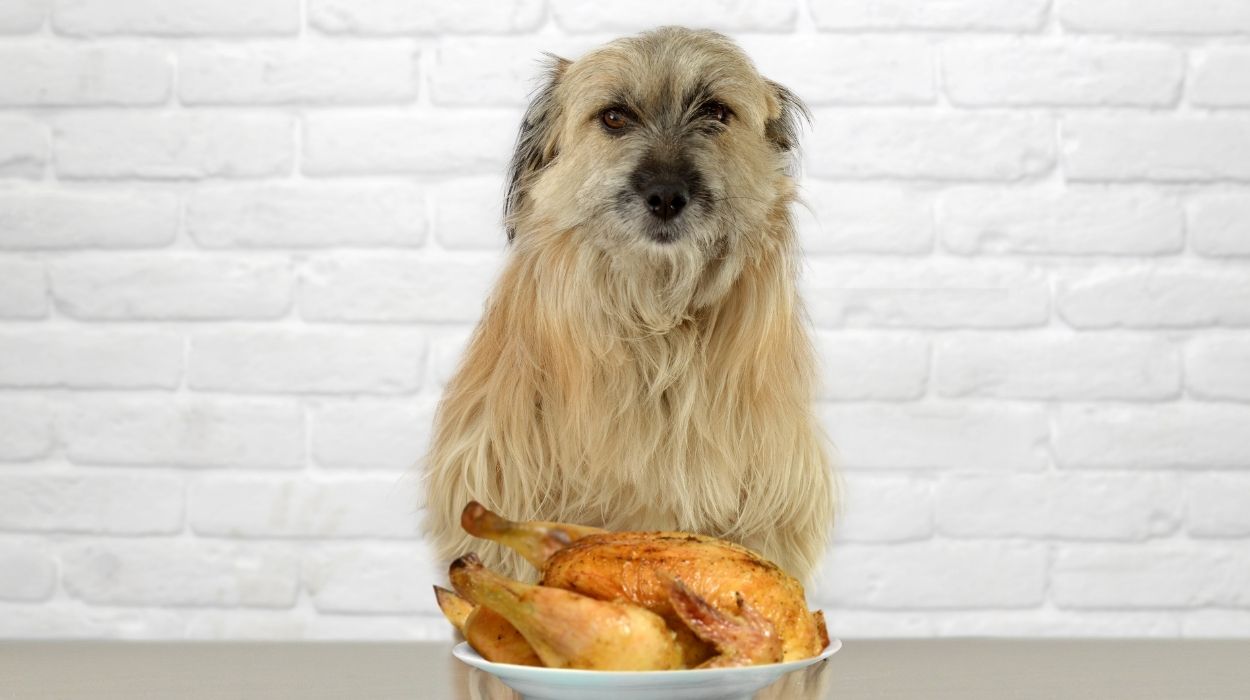Do you know who is more excited than you to bite off those spicy Orange Chicken pieces that you’ve ordered? You saw that coming, your dog!
We know you might feel guilty when your little pup tries to convince you with its irresistible eyes to share your Orange Chicken with him. But if you’re considering giving him a few pieces, let us stop you right there!
This article will clear all your confusion regarding your dog’s health by addressing if you should feed orange chicken to your dog or not and how safe it’s for him.
What is Orange Chicken?

Basically, orange chicken is battered, fried, and crispy chicken coated in a spicy-sweet orange sauce. Following are the main ingredients present in a typical orange chicken recipe:
- Skinless chicken (containing bones)
• Salt and pepper
• Orange juice
• Cornstarch
• Flour
• Sugar
• Sesame oil
• White distilled vinegar
• Egg
• Garlic
• Ginger
• Soy sauce
• Chili flakes
Can Your Dog Consume Orange Chicken?

The short answer is yes, a dog can consume orange chicken. But there can be severe side effects of it.
How severe side effects of consuming orange chicken will depend on some factors including how thoroughly it’s cooked, what flavors are added, and what artificial chemical components it has.
Well, this doesn’t mean we are recommending you to feed your dog with orange chicken.
The recipe for 2 orange chicken breasts contains one entire cup of packed brown sugar! Isn’t that enough to make you cautious regarding your dog’s health?
In a nutshell, it’s okay if your dog accediently eats orange chicken in very small quantities once a week.
Warning: Orange chicken is fried, containing high-fat content. Its excessive consumption can lead to issues such as pancreatitis and indigestion in your dog.
Is Orange Chicken Harmful For Your Dog?
Do you know what is common between sugar, soy sauce, ginger, and fatty oils? They are used in the Orange Chicken recipe and are also some of the most dangerous foods for dogs.
We will now deeply understand how different food components put into orange chicken pose harm to your cute doggo.
-
Skinless chicken thighs: A typical orange chicken recipe contains the skinless chicken of the thigh area instead of chicken breast. The thigh area is less expensive and more tender than the breast piece. However, the former contains thrice the level of fat and saturated fat than the latter.
Spices: The spices put in orange chicken lead to some serious complications in a dog’s digestive system. Your cute lil pup might suffer from diarrhea, vomiting, abdominal pain, and dehydration after eating up considerable amounts of spicy orange chicken.
Onion and Garlic: Onion and garlic are the primary ingredients of orange chicken. They both are known to damage red blood cells (RBCs) in dogs. As RBCs carry oxygen around the dog’s body, consuming garlic and onion can cause anemia.
Cornstarch and flour: Cornstarch and flour contain high amounts of sugar and can gradually lead to weight gain, cavities, and diabetes among other metabolic changes. As sugar causes gastrointestinal problems, the microbiome balance of a dog’s stomach gets disrupted.
Oils and fats – Orange chicken is known to contain fats and oils in generous amounts. They both form an extremely unhealthy combination for your dog’s health.
Your dog’s pancreas is most likely to undergo inflammation after consuming substantial amounts of orange chicken. This painful inflammation of the pancreas is known as pancreatitis.
-
Cooked Bones: Like regular chicken, orange chicken too contains bones. As cooked bones can easily break once consumed, they can rupture a dog’s intestines. Thus, cooked bones are known to cause intestinal blockages in canines and can be fatal if consumed.
What Symptoms Do Dogs Develop After Eating Excessive Amounts of Orange Chicken?

Excessive consumption of orange chicken by your dog can be hazardous. Given the toxicity of orange chicken ingredients, the following are some symptoms that your dog is most likely to develop after eating excessive amounts of orange chicken:
1. Salt poisoning
Due to the fact that orange chicken contains high sodium concentrations, excessive consumption of soy sauce and salt makes dogs extremely thirsty and dehydrated. It can even lead to sodium ion poisoning and hypernatremia.
Following are the major symptoms of excessive salt consumption:
-
Diarrhea
Loss of appetite
Extreme thirst and urination
Muscle spasms
Depression
Loss of balance
Seizures
Vomiting
Death (in some cases)
2. Pancreatitis
As mentioned earlier, the life-threatening condition of pancreatitis is caused due to high-fat diet in dogs, the common signs of which include: :
- Loss of appetite
- Vomiting
- Lethargy
- Fever
- Abdominal pain
- Weight gain and obesity
The high-calorie fat-laden dish of orange chicken leads to weight gain in dogs. Moreover, obesity causes diabetes in dogs along with heart disease and certain kinds of cancer.
What To Do If Your Dog Consumed Orange Chicken?
No need to panic in case your dog has consumed orange chicken in small quantities. Just give him plenty of water afterwards as they would be extremely thirsty. Drinking fresh water will help your pup naturally flush the salt out of his system.
If your doggo gets sick or develops an upset stomach from eating orange chicken, give him a bland diet of boiled lean meat and rice for the next 2 days. Treating your dog’s upset stomach with utmost care and caution is extremely important during this period.
After overeating orange chicken, your dog may develop pancreatitis. In such severe cases, you should consult your veterinarian and might even have to hospitalize him for oxygen and IV fluid therapy.
Tip: You can give your dog Pepcid (famotidine) 0.25 mg/pound every 12 hours for 3 consecutive days. It will provide much relief to his stomach and pancreas.
What Is The Nutritional Value of Orange Chicken?
As little amounts of orange chicken provide omega 6 and 3 along with fatty acids, it is beneficial for their skin, joints, and overall brain health.
However, as mentioned earlier, some ingredients can lead to complications in your dog. The following table depicts the nutritional value of orange chicken (100 gram):
| Carbohydrates | 19 g |
| Sugars | 3 g |
| Fats | 3 g |
| Proteins | 11 g |
| Sodium | 280 mg |
| Cholesterol | 10 mg |
Source: https://animalinformer.com/can-dogs-have-orange-chicken/
How To Keep Your Dog From Consuming Orange Chicken Again?
Does your dog have a habit of vanishing away your orange chicken while you’re in the kitchen? If yes, then in such cases, you must watch your dog real close when you have ordered orange chicken from your favourite restaurant.
You must make sure not to leave his sight until you have eaten all of the ordered orange chicken.
FAQs
Q. Can Dogs Eat Panda Express Orange Chicken?
No. Although the website of Panda Express mentions that their outdoor tables are dog-friendly, this does not mean that their orange chicken is dog-friendly too. However, feeding just one or two pieces of Panda Express orange chicken is alright if it does not include any spices, onion, or garlic.
Q. Can puppies eat orange chicken?
No. Any meat containing bones (like orange chicken) is not good for your puppy as their stomachs are very sensitive. Puppies should not consume orange chicken otherwise it might lead to diarrhea, sickness, and severe gastrointestinal issues.
Conclusion
Orange chicken is not safe for dogs. Period. Whenever the thought of feeding orange chicken travels across your mind, pause, and say ‘no’ to yourself.
In fact, incorporation of chicken as an ingredient in some cases can be problematic. Especially when the dog is allergic to the protein present in chickens.
However, if you still might want to feed orange chicken to your puppy, then try it’s safer alternatives like bone broth, pork, peanut butter, salmon, eggs, and quinoa. We also suggest you consult with your vet first.
Was the information stated in this article beneficial for you? Let us know your thoughts and opinions in the comment section below!

Dr. Aram Baker has been with Santa Clarita Animal Hospital since 1995 and his special interests include behaviour medicine and dermatology. He graduated from the Cleveland Humanities Magnet Program in Reseda, CA and attended California State University at Northridge where he received a Bachelor’s degree in biology. He went on to pursue his Doctorate in Veterinary Medicine at the University of California at Davis. He also spent time in the zoological medicine department at U.C. Davis during his Junior and Senior years. He is dedicated to caring for all pets big or small, young or old with compassion, patience, kindness, and love.
